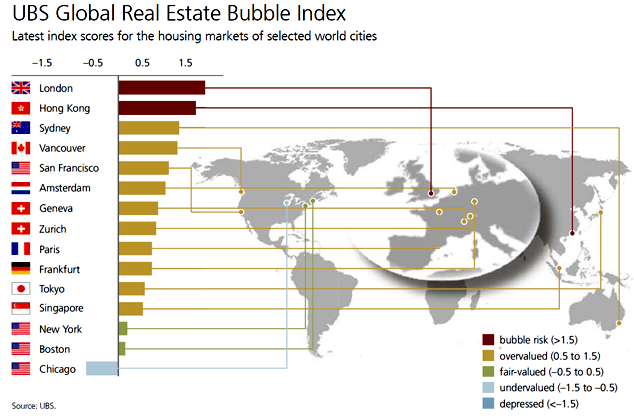
House prices are bubbling over in several of the world’s top cities, says UBS, which has created a Global Real Estate Bubble Index to measure the potential for housing bubbles. Here are the five most at risk, with their index score. A score over 1.5 is a “bubble risk”, while a score between 0.5 and 1.5 is “overvalued”.
1. London – 1.88
(average house price £500,000)
UBS reckons London is the most overvalued market, based both on price-to-income and price-to-rent ratios. Average real (afterinflation) dwelling prices are up by almost 40% since the start of 2013, more than offsetting all financial-crisis-related losses. House prices no longer bare any resemblance to local household earnings due to purchases for investment purposes by both local and global buyers.
2. Hong Kong – 1.67
(average house price HK$500,000)
Fuelled by a credit boom, Hong Kong’s residential market performed relatively well both during and right after the financial crisis. Property prices have pretty much trebled since 2003, when the market bottomed in the aftermath of the Asian crisis. However, weaker economic growth in China, a worsening job market and the risk of rising interest rates are major fears.
3. Sydney – 1.39
(average house price AU$780,000)
In Sydney, real housing prices have risen by almost 30% since 2012, even as rents and incomes have stagnated, buoyed by the commodities boom and strong Asian demand. Again, a slowdown in China, combined with tighter mortgage regulations, increase the risk of a significant correction in the medium term.
4. Vancouver – 1.35
(average hosue price CDN$500,000)
Although prices were already high in Vancouver before the financial crisis, they have risen another 25% since 2006. Like Australia, the commodities supercycle and Asian demand amplified the gains. Rents and incomes registered only single digit growth rates in the same period. The commodity crash and unpredictable foreign demand cloud the current prospects.
5. San Francisco – 1.15
(average house price US$1m)
After a severe price correction of 30% (in real terms) between 2006 and 2011, the market rebounded in the wake of the technology boom. Current real prices stand only 4% below peak and have outperformed the overall US market. For now at least, these high prices are supported by limited supply growth.